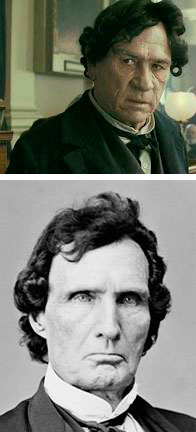|
|
|
|
|
Dear Zinn Education Project friends,
None of this would be possible without the support of our donors. We would like to thank all of our 2012 donors and those who have helped kicked off 2013 with a strong start. It's never too late or too early, too little or too much ----YOUR contribution makes a difference. Donate today!
|
|
|
|
|
|
|
|
 Why I'm Rooting for Tommy Lee Jones Why I'm Rooting for Tommy Lee Jones
Until the modern Civil Rights Movement those who wrote U.S. history took a stick to Thaddeus Stevens. But he didn't care. By the time he died in 1868 he had earned the appreciation of millions of slaves he helped free, and further admiration as "the father of the 13th, 14th, and 15th Amendments." But until Tommy Lee Jones donned the man's grim look, sharp wit, bulky swagger, and advanced racial views, Stevens faced a thrashing in classrooms, textbooks, and movies. Read more.
Rethinkin' Lincoln on the 150th Birthday of the Emancipation Proclamation
Spielberg and screenwriter Tony Kushner chose to concentrate on the final months of Lincoln's life, when, as the film shows in compelling fashion, the president went all-out to pass the 13th Amendment, forever ending U.S. slavery. Missing from this portrait is the early Lincoln ----the Lincoln that did everything possible to preserve slavery. Read more.
Also read: Tarantino Bloodies the Truth: A History Teacher's Lament
|
 American History Lessons American History Lessons
By Melissa Harris-Perry
We are in the final hours of February. These are the last moments of this year's Black History Month. February is always my busiest month for travel and public lectures as I join dozens of other professors whose research takes on sudden relevance for four short weeks. Typically, I spend some time in February responding to queries about the origins of the month-long observance. Invariably, I am also asked to defend its continuing relevance. Student reporter: Do we really need a separate black history month now that we have a black president? Me: Can you name five important African-Americans, not including Martin Luther King Jr. and Barack Obama, and tell me something about their contributions to America? Student reporter: (Silence) Me: Yes, we still need Black History Month.  Stripmining Black History Stripmining Black History By Jeff Biggers As schools, communities and politicians across the country celebrate Black History Month in February, they will be remiss if their lessons don't include the coal fields of Fayette County, West Virginia. There, in the 1890s, a teenage African American followed his brothers into the coal mines, serving what Carter Woodson called his "six-year apprenticeship." In the evenings, the young Woodson would gather with other black coal miners, read the newspaper, and listen to their extraordinary stories of life underground, and their struggles during the Civil War and Reconstruction era...Woodson went on, of course, to become the "Father of Black History," and one of our country's most celebrated historians. Few people realized, however, that West Virginia once again played prominently in Woodson's career in 1920.
Woodson's and Black History Month's largely overlooked origins in West Virginia are not the only casualty in our selective memory on American history. Read more. |
|
New addition to the Zinn Education Project website
 | |
Fellow Workers album by Ani DiFranco and
Utah Phillips
|
Essay on Labor by Howard Zinn
Liner Notes to Fellow Workers
Before I became a college professor I was a shipyard worker. Before I was a writer I was a warehouse worker. But whatever I did, I was always a member of a labor union...Whatever I was, blue collar or white collar, ditch digger or waiter (yes, I did those things, too) or faculty member in a large university, I was a worker. By that I mean: I was subject to someone's authority, some corporation, some bureaucracy. Some invisible power could decide my wages, my hours, whether I would keep my job or lose it. That's why I always joined a union. Read more. |
|
Thank you for bringing a people's history to the classroom!
Sincerely,
Lauren Cooper
Zinn Education Project Coordinator
|
|
|
|
|